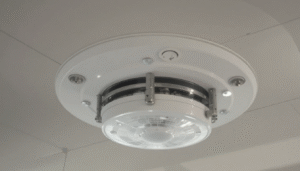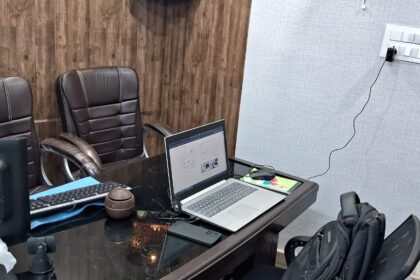
Marine smoke detectors play a vital role in safeguarding vessels and marine infrastructure. In Dubai, where maritime trade and transport form a large part of the economy, the importance of reliable smoke detection systems cannot be overstated. These specialized detectors are designed to perform effectively in challenging marine environments, offering early warnings of potential fires. Understanding their functionality, types, and maintenance can help ensure onboard safety and compliance with international standards.
What is a Marine Smoke Detector?
A marine smoke detector is a device specifically engineered to detect smoke and fire-related hazards in ships, offshore platforms, and marine facilities. Unlike conventional smoke detectors used in buildings, marine detectors are designed to operate under the demanding conditions of sea environments. They can withstand humidity, vibration, salt corrosion, and temperature fluctuations, which are common in maritime settings.
These detectors form part of a ship’s fire detection and alarm system, helping to prevent catastrophic events by alerting the crew at the earliest stage of fire development. Early detection allows immediate action, preventing damage to cargo, vessel systems, and human lives.
Types of Marine Smoke Detectors
1. Ionization Smoke Detectors
Ionization smoke detectors are sensitive to small smoke particles produced by fast-flaming fires. They contain a small amount of radioactive material that ionizes the air between two plates, creating a current. When smoke enters the chamber, it disrupts this current, triggering the alarm.
2. Photoelectric Smoke Detectors
These detectors use a light beam and a sensor to detect larger smoke particles typically generated by smoldering fires. When smoke scatters the light beam inside the chamber, it causes the sensor to activate the alarm. Photoelectric detectors are widely used on ships for living quarters and control rooms.
3. Multi-Sensor Smoke Detectors
Multi-sensor detectors combine optical and thermal sensors. They can identify both smoke and heat, offering a more comprehensive detection method. This dual sensitivity helps reduce false alarms caused by engine exhaust or cooking fumes on marine vessels.
4. Aspirating Smoke Detectors
Aspirating systems continuously sample air through a network of pipes. They are highly sensitive and can detect smoke particles even before they become visible. These detectors are ideal for cargo holds, control rooms, or areas where early warning is critical.
How Marine Smoke Detectors Work
Marine smoke detectors operate by continuously monitoring the air for smoke particles or changes in heat levels. Once detected, they send a signal to the vessel’s fire alarm control panel. The system then triggers an audible and visual alarm throughout the ship, alerting crew members to take immediate action.
The detectors are strategically installed in accommodation areas, engine rooms, cargo spaces, and electrical panels. These systems are often integrated with automatic fire suppression systems such as sprinklers or gas-based extinguishing systems for enhanced safety.
Importance of Marine Smoke Detectors in Dubai’s Maritime Industry
Dubai’s position as a global maritime hub makes fire safety a top priority. With numerous vessels docking at its ports and operating in surrounding waters, maintaining compliance with marine safety regulations is essential.
Marine smoke detectors help ensure that vessels meet the International Maritime Organization (IMO) and SOLAS (Safety of Life at Sea) requirements. These standards mandate fire detection systems on all types of ships, including cargo, passenger, and offshore vessels.
Installing reliable smoke detection systems protects not only human life but also valuable cargo and the marine environment. Early detection minimizes downtime, repair costs, and potential pollution caused by onboard fires.
Key Features of Marine Smoke Detectors
Marine smoke detectors are built with features that allow them to function reliably in maritime conditions. Some of the essential features include:
- Corrosion-resistant housing: Protects against salt and humidity.
- Vibration and shock resistance: Ensures stable operation even in rough sea conditions.
- Temperature tolerance: Operates effectively across wide temperature ranges.
- Waterproof design: Prevents moisture interference.
- Low maintenance requirements: Ensures consistent performance with minimal upkeep.
These detectors are also tested for electromagnetic compatibility to avoid interference with ship communication and navigation systems.
Installation and Maintenance
Proper installation and maintenance are crucial for the effective functioning of marine smoke detectors. The placement of detectors must comply with SOLAS and class society regulations, ensuring full coverage of all critical areas onboard.
Regular maintenance involves:
- Monthly system checks to confirm alarm functionality.
- Annual inspections by certified marine technicians.
- Cleaning and calibration to remove dust or salt deposits.
- Replacement of aging sensors to maintain sensitivity and reliability.
Scheduled maintenance ensures compliance with maritime safety laws and prevents malfunction during emergencies. To get more information click here..
Regulatory Standards for Marine Smoke Detectors
Marine smoke detectors installed on vessels in Dubai must comply with international safety standards, including:
- SOLAS (Safety of Life at Sea) Convention
- IMO (International Maritime Organization) guidelines
- IEC 60092 standards for electrical installations on ships
- Classification society approvals (Lloyd’s Register, ABS, DNV, etc.)
Adhering to these standards ensures that detection systems perform accurately and reduce the risk of fire-related accidents at sea.
Choosing the Right Marine Smoke Detector
Selecting the appropriate smoke detector depends on several factors:
- Type of vessel (cargo, passenger, tanker, offshore platform)
- Area of installation (engine room, cabin, cargo hold)
- Environmental conditions (humidity, temperature, air pressure)
- Power supply compatibility
- Certification requirements
Marine engineers typically conduct a risk assessment before finalizing the type and placement of detectors to ensure full coverage.
Conclusion
Marine smoke detectors are essential safety components that protect ships, cargo, and lives at sea. In Dubai’s growing maritime sector, ensuring the presence of reliable and compliant smoke detection systems is a key aspect of operational safety. Regular inspection, proper installation, and adherence to international standards help maintain high safety levels across the region’s ports and vessels.
As Dubai continues to strengthen its maritime infrastructure, awareness about marine fire detection systems remains critical. Marine smoke detectors provide the first line of defense against potential onboard fires, securing not just assets but also the future of the maritime industry.



